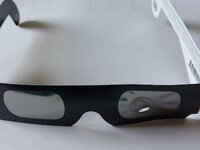You are using an out of date browser. It may not display this or other websites correctly.
You should upgrade or use an alternative browser.
You should upgrade or use an alternative browser.
Eclipse glasses destroyed by PD35
- Thread starter Watts_on
- Start date
 Help Support Candle Power Flashlight Forum
Help Support Candle Power Flashlight Forum
- Joined
- May 4, 2014
- Messages
- 650
I think there might be a bit of a misunderstanding in this one, no flashlight is more powerful than the sun. The thing you're looking for instead is intensity or concentration of light, a weaker flashlight able to focus its beam on a small target made out of a material which can soak up as much energy from it as possible is more effective at setting fire to something than a gigantic ball of plasma many times our planet an unfathomable distance away.To try out my eclipse glasses, I held them up to my Fenix PD35. Its 1700 lumens quickly melted a hole in the thin plastic. I believe that at a short distance, a powerful flashlight is brighter than the sun.
That is until you get a magnifying glass and start using it along with the sun.
Kestrel
Flashaholic
Was curious so I ran some numbers;
The heat flux /at the suns' surface/ is about 6000 W per sq. cm.
For context, the max heat flux of a modern microprocessor core is pushing 200 W per sq. cm.
Honestly, ~3% of the sun' flux isn't too bad.
Edit: that's up from ~1% ~30 years ago when I was studying heat flow in composite materials.
The heat flux /at the suns' surface/ is about 6000 W per sq. cm.
For context, the max heat flux of a modern microprocessor core is pushing 200 W per sq. cm.
Honestly, ~3% of the sun' flux isn't too bad.
Edit: that's up from ~1% ~30 years ago when I was studying heat flow in composite materials.
Last edited:
Similar threads
- Replies
- 44
- Views
- 4K
- Replies
- 3
- Views
- 3K
Latest posts
-
-
Thrunite rocks !!! Whats your favorite brand ?!?
- Latest: Chauncey Gardiner
-
-
-
-
-

